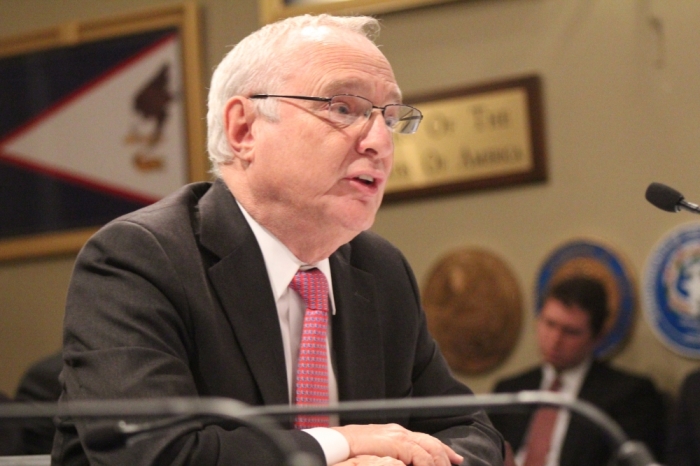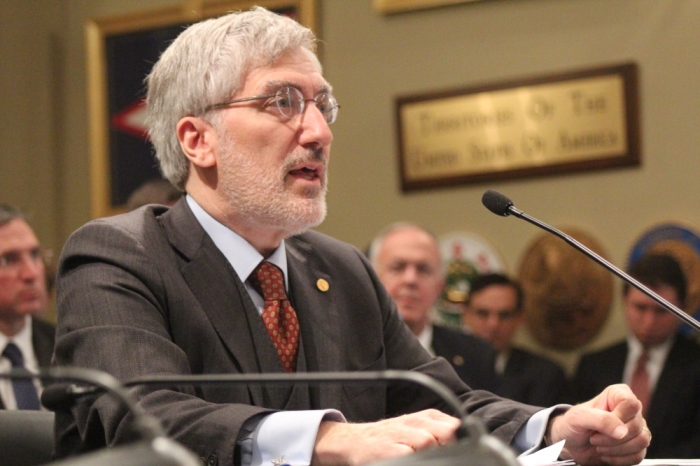Obama State Dept. Should Tell Truth About Iraq, Syria Religious Freedom Abuses, USCIRF Chair Robert P. George Says

WASHINGTON — Although millions of religious minorities have been displaced, killed or enslaved in Iraq and Syria due to the "systematic, ongoing, and egregious violations" of religious freedom carried out by the Islamic State, other militant groups and the Syrian regime of Bashar al-Assad, both nations were absent from the State Department's list of countries of particular concern announced last Friday.
During a Tom Lantos Human Rights Commission hearing on Capitol Hill Tuesday, David Saperstein, a Rabbi who heads the State Department's Office of International Religious Freedom, was asked by the commission's co-chair, Rep. Joe Pitts, R-Penn., what his office's stance is on Iraq and Syria being left of the list.
As the country of particular concern designation was created under the 1998 International Religious Freedom Act, Saperstein explained that Iraq was left off the list because the statute requires for actual governments to be the violators of the "systematic, ongoing, egregious violations" of religious freedom.
"[The designation] talks about governments that engage in egregious [violations]. So, the way the law was written does not talk about non-state actors who engage in 'egregious, ongoing, serious violations' of religious freedom," Saperstein responded. "The Iraqi government has clearly made an effort to try and stop them from engaging the kind of activity that we are talking about. On that basis in past years, the determination was made that did not rise to that level."
Although the Assad regime is guilty of committing its own systemic human rights abuses, Saperstein seemingly dodged justifying why Syria has been left off the list by jumping off topic to mention how the State Department has designated Tajikistan as a new country of particular concern. He eventually returned to explaining Iraq's absence from the list.
"But the text does remain, what the country does. It can be the country's complicity by remaining silent and not acting if non-state actors are engaged in violence against religious minorities or depriving others of their religious freedom," Saperstein, the first-ever chairman of the U.S. Commission on International Religious Freedom (USCIRF) from 1999 to 2000, said. "But on this stage, certainly the Iraqi government is vigorously acting to try to protect them. On that basis, we have not found it to be an appropriate designation."
USCIRF, a bipartisan commission created by the 1998 International Religious Freedom Act to make recommendations to the federal government, has recommended that designating both Iraq and Syria as countries of particular concern is one of the first steps towards helping end the genocide and creating a peaceful reconciliation in the region.
Later in the hearing, current USCIRF Chairman Robert P. George, the McCormick Professor of Jurisprudence at Princeton University, contested Saperstein's explanation.

"We at USCIRF believe [designating Iraq and Syria as countries of particular concern] has got to be done so that we can tell people the truth," George told the hearing. "The truth of the matter is that we have 'systematic, ongoing and egregious violations' of fundamental religious freedom in these countries."
In an interview following the hearing, George told The Christian Post that he did not buy Saperstein's justification for the State Department leaving Iraq off the list.
"Our commission sees things differently," George explained. "The U.S. Commission on International Religious Freedom is strongly reiterating its recommendation to the State Department to list both Syria and Iraq as countries of particular concern."
"Clearly in the case of Syria, the Assad regime is guilty of very serious abuses of religious minorities. For example, the Sunnis, but also the Christians," George continued. "In Iraq, the government has a poor record. Now, we recognize in situations like Iraq and Syria that the government does not have all of its territory under its control. We understand that. But the governments are nevertheless failing in significant ways."
George asserted that the governments are "responsible, in part," for the violations of religious freedoms that are taking place inside their borders.
"If a nation, any nation, is guilty of systematic, ongoing and egregious violations of religious freedom, then it is not optional. The State Department is supposed to designate that country as a CPC," George stressed. "It is precisely that standard that the statute calls for."
George added that the statute needs to be revised to give the State Department the ability to punish terrorist groups and other non-state actors in the same manner that governments are hindered by "CPC" designations.
"We believe that it is time for some statutory revision to take place to permit non-state actors to be designated with something similar to the CPC designation that would trigger such things as freezing bank accounts to try and cut of the sources of funding for these terrorist groups," George told CP. "Even while we wait for Congress to take that step, we still think that the nations that are responsible, the rulers, the leaders that are responsible for the systematic, ongoing and egregious violations of religious freedom need to be held accountable. That is what the CPC designation is meant to do."





























